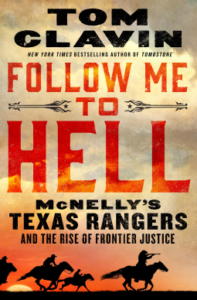Riveting Ride Through Texas History
By M. CLARE HAEFNER
Cover courtesy of the book publisher
 Tom Clavin hooked me from the prologue with this brief description of his book’s protagonist, Capt. Leander McNelly. “He was barely five foot five and 125 pounds, dressed almost like a dandy — brush jacket, duck pants, calfskin leggings, sometimes a beaver hat — and wore his long beard neatly trimmed. However, his men — occasionally referred to as ‘Little McNellys’ in newspaper accounts — followed him because of the force of his personality, devotion to law and order.” I had to know more about what made someone of such small stature a legend in Texas Ranger history.
Tom Clavin hooked me from the prologue with this brief description of his book’s protagonist, Capt. Leander McNelly. “He was barely five foot five and 125 pounds, dressed almost like a dandy — brush jacket, duck pants, calfskin leggings, sometimes a beaver hat — and wore his long beard neatly trimmed. However, his men — occasionally referred to as ‘Little McNellys’ in newspaper accounts — followed him because of the force of his personality, devotion to law and order.” I had to know more about what made someone of such small stature a legend in Texas Ranger history.
As the pages unfolded in Follow Me To Hell: McNelly’s Texas Rangers and the Rise of Frontier Justice (St. Martin’s Press, April 2023), it didn’t take long to learn why his men were willing to follow Leander McNelly anywhere — he never asked them to do anything he wouldn’t do himself.
That willingness to take on any enemy in the name of justice made McNelly and many of his men legends, while cementing the Texas Rangers’ status in history and setting the course for the agency’s place in law enforcement today.
The book’s title comes from a speech McNelly gave his men before an incursion into Mexico while chasing cattle rustlers: “Boys,” McNelly said, “I may lead you into hell, but I’ll get you out if you do exactly as I tell you to do. I’ll never send you into a battle, I’ll lead you. All I ask any man to do is follow me.”
Follow him they did, from chasing down rustlers in Mexico to breaking up a legendary feud in North Texas. McNelly and his men stood for justice and strived to bring order to a lawless land after the Civil War.
Follow Me To Hell is a masterful and riveting look at Texas history, from Stephen F. Austin’s arrival in the Mexican territory and the battle for independence, to the quest for statehood and the struggle to tame a wild land in the late 19th century.
There’s so much history to recount that McNelly doesn’t even enter Clavin’s book until Act II. It’s worth the wait, as the story of early Texas Rangers like Jack Hays needs to be told to set the stage for the young captain’s rise through the ranks.
Fighting for the Confederacy, McNelly was only 21 when the Civil War ended. After a few years of farming and married life in Washington County as he worked to recover from the effects of consumption that plagued him throughout the war, McNelly accepted a commission in the Texas State Police in 1870. He joined the newly minted Texas Rangers in 1874 and was soon sent to quell the Sutton-Taylor feud in DeWitt County, which was well on its way to becoming the longest and bloodiest war between families in Texas history.
When taking command of the new unit, McNelly “already was a dying man, which makes his career all the more remarkable,” Clavin writes.
After pausing the feud, McNelly’s Rangers were sent to help tame the wild Nueces Strip — a no man’s land between the Nueces and the Rio Grande where “well-organized bands of Indians, Mexicans and American cattle and horse thieves” reigned.
Risking war with Mexico in 1875, McNelly urged his men to pursue rustlers across the Rio Grande. Clavin writes: “Boys, you have followed me as far as I can ask you to unless you are willing to go with me,” McNelly told them in a speech that must have taxed his ailing lungs. “It is like going into the jaws of death with only twenty-six men in a foreign country where we have no right according to law. But as I have gone this far I am going to finish with it. Some of us may get back or part of us or maybe all of you or maybe none of us will get back. I don’t want you unless you are willing to go as a volunteer. Understand there is no surrender in this. We ask no quarter nor give any.” He concluded: “If any of you don’t want to go, step aside.” No one did.
With courage like that, it’s no wonder Leander McNelly was among the first class inducted to the Texas Ranger Hall of Fame in 1976.
Texas Monthly wrote of McNelly: “Courageous and gentlemanly, utterly devoted to his men and his mission, a remorseless killer, and dead himself by the holy age of 33. From McNelly flows the rich blood of Ranger lore.”
Explore it for yourself by reading Follow Me To Hell when it’s published April 4. It’s one heck of a ride.




